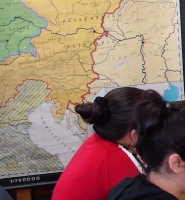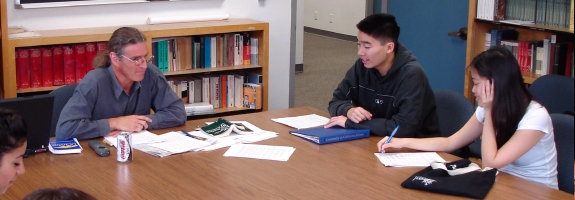






Recent Seminars
• Fall 2013• Fall 2012 • Fall 2011 • Fall 2010 |

FALL 2012 TRANSFER SEMINARS
SCHOOL OF HUMANITIES Language and culture in Latin America: African and American Indian contributions Concentrating on Latin America, this course examines the linguistic and cultural contributions by Africans (slave trade) and American Indians. All lectures are graphic (Powerpoint), and students are invited to explore a geographic area (or language) of their choice in greater depth. No prior knowledge of spoken or written Spanish or American Indian languages is required. Prerequisites: Nada, except...an open mind and a disposition to gain a deeper appreciation for African and American Indian contributions to the Americas. Born in Switzerland, Prof. Schwegler has learned Spanish and about a dozen other languages. His research on the Spanish language and its dialects have taken him to virtually every corner of Latin America (he often does field work in remote jungles in South America). The author of over 50 scholarly articles and several books, Prof. Schwegler has been a guest professor at several universities in Europe, the United States, and Latin America (he spent 2 years in Costa Rica as Director of UC's Education Abroad Program, and taught graduate seminars at the University of Havana). In 2012, he completed a voyage around the world with Semester at Sea (University of Virginia), during which he visited Brazil, S. Africa, India, China, Vietnam, and Japan, and several other countries. SCHOOL OF INFORMATION AND COMPUTER SCIENCES Protecting Yourself from Cyber-Attacks The goal of this seminar is to teach regular computer users how to protect their computers and data from attacks by computer hackers. With a little bit of knowledge about the nature of computer attacks, you can confound the vast majority of attackers without too much effort. We will introduce the most common attacks and describe how to recognize them and defend against them. Topics to be covered include the following: * Identity Theft and Phishing - How these attacks are executed Students will read news articles about current cyber-attacks. Students will setup a firewall. Ian G. Harris is currently an Associate Professor in the Computer Science Department. He received his BS degree in Computer Science from Massachusetts Institute of Technology in 1990. He received his MS and PhD degrees in Computer Science from the University of California San Diego in 1992 and 1997 respectively. His research interests involve the security and testing of hardware and software systems. His current research projects include security testing, embedded software, and hardware/software validation. Beyond Java and C++: Functional Programming in Scheme In the 55 years we've had high-level programming languages, we've learned some things about how to write reliable software quickly, cheaply, and accurately. Some of those things are part of common programming languages like Java or C++, but some aren't: The technique of functional programming and the programming language Scheme provide a perspective on programming and a set of advantages that''s different from what you get in Java or C++. (UCI students have seen this material in ICS 22 or Informatics 41. This seminar gives transfer students the same experience in a manageable package.) References: * Introduction to Scheme and Racket, http://docs.racket-lang.org/quick/index.html * How to Design Programs, second edition, online at Students will be encouraged to bring laptops to class for brief mini-lab sessions; there will also be modest suggested exercises for them to try (typically in pairs) between class meetings. David G. Kay came to UCI from UCLA in 1990. He has been teaching computer science in one way or another since 1971, so he has seen a lot of programming languages come and go. Besides computer science, he holds degrees in linguistics and law; at UCI he teaches courses in introductory computer science (for majors and for non-majors), human-computer interaction, programming languages, technical communication, pedagogy for TAs and for undergrads, and computer law. SCHOOL OF MEDICINE Introduction to Immunology This is a basic course in immunology that is intended to be an introduction to the subject. The seminar will focus on immunological mechanisms responsible for major diseases (cancer, transplantation, infections, autoimmunity etc) by defining some commonly used terms and describing the specific cells and tissues involved in these diseases. Immunotherapy against these diseases will also be discussed. We will discuss news articles in immunology related to many diseases and understand the basic immunology related to the disease. Anshu Agrawal is a faculty in the school of medicine. Her expertise lies in the area of innate immunity with particular focus on dendritic cells. Her research focus is on manipulation of immune response using dendritic cells as well as to understand the age-associated changes in the function of these cells. Exploring How you Gain a Sense of Control n your Life This seminar explores how humans in general and you in particular, seek to gain and maintain a sense of control. Readings and discussions from psychological research, cross-cultural findings, religious, scientific, and political perspectives are explored. We might call this course "psychology from the inside/out." Students should come prepared to think critically, reflect deeply, and enjoy the challenging process of self-exploration. READINGS: (Excerpts and Handouts).
Deane H. Shapiro, Jr., Ph.D. devoted his professional life (and much of his personal life!) to seeking to understand how individuals can gain, maintain, and regain a positive sense of control in their lives personally, interpersonally, and in their views of the nature of the universe. His research involved developing a theory of human control, a psychological test to measure a person’s control profile (the SCI), and a specific therapeutic approach (Control Therapy) to match the most effective strategies to a person’s particular control profile. Control Therapy rests on the premise that issues of personal control (e.g., desire for control, fear of losing control, power struggles) underlie most concerns brought to therapy; that there are individual differences in people’s Control Profiles in terms of their preferred modes for facing this central issue of gaining and maintaining a sense of control; and that for a specific clinical problem, matching clinical control-enhancing interventions to the individual’s Control Profile maximizes the opportunity for therapeutic success. SCHOOL OF PHYSICAL SCIENCES Playing Havoc with the Product Rule: an Introduction to Non-Associative Algebra Much of the algebra taught in the undergraduate curriculum, such as linear algebra (vector spaces, matrices), modern algebra (groups, rings, fields), number theory (primes, congruences) is concerned with systems with one or more associative binary products. For example, addition and multiplication of matrices is associative: A+(B+C)=(A+B)+C and A(BC)=(AB)C. In the early 20th century, physicists started using the product A.B for matrices, defined by A.B=AB+BA, and called the Jordan product (after the physicist Pascual Jordan 1902-1980), to model the observables in quantum mechanics. Also in the early 20th century both mathematicians and physicists used the product [A,B], defined by AB-BA and called the Lie product (after the mathematician Sophus Lie 1842-1899), to study differential equations. Neither one of these products is associative, so they each give rise to what is called a nonassociative algebra, in these cases, called Jordan algebras and Lie algebras respectively. Abstract theories of these algebras and other nonassociative algebras were subsequently developed and have many other applications, for example to cryptography and genetics, to name just two. Lie algebras are especially important in particle physics. Using only the product rule for differentiation, which every calculus student knows, the seminar will introduce the subject of nonassociative algebras, as well as other algebraic systems which have a ternary rather than a binary product, with special emphasis on Jordan and Lie structures. Two of the goals are to introduce the notion of module and show how it is used in the sophisticated subject called homological algebra. (Modules are usually not taught in an undergraduate curriculum) The material for the seminar will be expanded from a series of four lectures given by the instructor to undergraduates, especially at Fullerton College during the past two years (http://math.uci.edu/~brusso/slid022912full3.pdf I was a founding member of the department of Mathematics in 1965. I served as chair of the department in 2001-2004 and as an Associate Secretary for the American Mathematical Society from 1998-2002. I taught Freshman seminars in Winter 2005 and Winter 2006. SCHOOL OF SOCIAL ECOLOGY Law School and Lawyers: Yesterday, Today and Tomorrow From the 19th century’s country-lawyer Abraham Lincoln to the 21st century’s Legally Blonde bombshell Elle Woods, the legal profession in America has seen constant change. This seminar will explore the evolution of legal education, from apprenticeship to university education, and the effect of ethnic immigration, the civil rights movement mid-century, and affirmative action. We will also explore the role of various kinds of lawyers in modern American society, examining the corporate law firm, contingency-fee and cause lawyers, and the the public defender. Along the way, we will explore what it takes to get admitted to law school and become a successful attorney in today’s competitive environment. Readings will be drawn from Abel, Lawyers: A Critical Reader, as well as excerpts from books such as Stevens, Law School; Turow, One L; Guerrero, Silence at Boalt Hall; Auerbach, Unequal Justice; Harr, A Civil Action; Smith, Case of a Lifetime; and Zitrin, The Moral Compass of the American Lawyer. The course will include guest speakers such as law professors, law school admissions personnel, lawyers in private practice, prosecutors and criminal defense attorneys, and public interest lawyers. Students will interview two lawyers and draw connections between the course readings and the educational and career paths of the interview subjects. I have a J.D. and Ph.D. from Boalt Hall, UC Berkeley’s law school. I practiced in a small law firm for a brief time before joining a law school faculty. In addition, I served as a law clerk for a number of judges in the federal courts. I have over twenty years of experience in pre-law advising, and have been active in initiatives sponsored by the State Bar of California to increase the diversity of law schools and the legal profession. CAMPUSWIDE HONORS PROGRAM Transfer Honors Seminar This seminar is for transfer students admitted to the Campuswide Honors Program (CHP) who are entering their first year at UC Irvine. This class will introduce you to UCI as a research university and to the Campuswide Honors Program, and will help you transition to our community of scholars. Topics include: UCI and its development, the meaning of honors, transitioning to UCI and strategies for academic success, the real-world impact of universities, exploring the libraries, introduction to research, how to identify and approach a research advisor, and goal setting and plans for the future. Discussion format. Readings, discussion, and brief writing assignments. Lisa Roetzel is the Associate Director of the Campuswide Honors Program (CHP), where she facilitates many of the programs and services the CHP provides. She enjoys introducing students to the CHP's community of scholars, and is particularly interested in meeting and working with new transfer students. Mary Gillis is the Senior Honors Advisor for the Campuswide Honors Program, and an alumna of UC Irvine and the CHP. She has led leadership seminars and courses on learning communities, and works closely with transfer students in the CHP. She looks forward to a great quarter as an instructor of Uni Studies 4! |
||||||||||||||||||||||||||||||||||||||||||||||||
| Transfer Seminar Program 611 Aldrich Hall Irvine, CA 92697-5670 Phone (949) 824-1955 Fax (949) 824-2161 A Division of Undergraduate Education Program © 2012 The Regents of the University of California All Rights Reserved |
